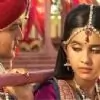which Partap was restricted was the mountainous region around,
though cliiefly to the west of the new capital. From north to
south, Kimibhalmer to Rakhablmath,^ about eighty miles in
length ; and in breadth, from Mirpur west to Satola east, about
the same. The whole of this space is moimtain and forest, valley
and stream. The approaches to the capital from every point to
the north, west, and south are so narrow as to merit the term of
defile ; on each side lofty perpendicular rocks, with scarcely
breadth for two carriages abreast, across wliich are those ramparts
of nature termed Col in the mountain scenery of Europe, which
occasionally open into spaces sufficiently capacious to encamp a
large force. Such was the plain of Haldighat, at the base of a
neck of mountain which shut up the valley and rendered it almost
inaccessible.* Above and belotv the Rajputs were posted, and
on the cliffs and pinnacles overlooking the field of battle, the
faithful aborigines, the Bhil, with his natural weapon the bow and
arrow, and huge stones ready to roU upon the combatant enemy.
glorious was the struggle for its maintenance. Clan after clan
followed with desperate intrepidity, emulating the daring of their
prince, who led the crimson banner into the hottest part of the
field. In vain he strained every nerve to encounter Raja Man ;
but though denied the luxury of revenge on his Rajput foe, he
^ [Tliis is impossible, because Sallm, aftenvards the Emperor Jahangir,
was only iu his seventh year. The generals in command were Man Singh
and Asaf Khan.]
fell before Partap, and but for the steel plates which defended
his howda, the lance of the Rajput would have deprived A.kbar
of his heir. His steed, the gallant Chetak, nobly seconded his
lord, and is represented in all the historical drawings of this
battle with one foot raised upon the elephant of the Mogul, while
his rider has his lance propelled against his foe. The conductor,
destitute of the means of defence, was slain, when the infuriated
animal, now without control, carried off Salim. On this spot
the carnage was imoiense : the Moguls eager to defend Salim ;
the heroes of Mewar to second their prince, who had already
received seven woiuids [339].^ Marked by the ' royal umbrella,'
which he would not lay aside, and which collected the might of
the enemy against him, Partap was thrice rescued from amidst
the foe, and was at length nearly overwhelmed, when the Jhala
chief gave a signal instance of fidelity, and extricated him with
the loss of his own life. Mana seized upon the insignia of Mewar,
and rearing the ' gold sun ' over his own head, made good his way
to an intricate position, drawing after him the brunt of the
battle, while his prince was forced from the field. With all his
brave vassals the noble Jhala fell ; and in remembrance of the
deed his descendants have, since the day of Haldighat, borne the
regal ensigns of Mewar, and enjoyed ' the right hand of her
princes.' ^ But this desperate valour was unavailing against
such a force, with a numerous field artillery and a dromedary
corps mounting swivels ; and of twenty-two thousand Rajputs
assembled on that day for the defence of Haldighat, only eight
thousand quitted the field alive.*
The Escape of Bana Partap Singh. " Partap, unattended, fled
on the gallant Chetak, who had borne him through the day, and
who saved him now by leaping a mountain stream when closely
pursued by two Mogul chiefs, whom this impediment momentarily
^ Three from the spear, one shot, and three by the sword.
^ The descendants of Mana yet hold Sadri and all the privileges obtained
on this occasion. Their kettle-drums beat to the gate of the palace, a
privilege allowed to none besides, and they are addressed by the title of Raj,
or royal.
pursuers gained upon Partap, and the flash from the flinty rock
announced them at his heels, when, in the broad accents of his
native tongue, the salutation Ho ! nila ghora ra aswnr, ' Ho ! rider
of the blue horse,' made him look back, and he beheld but a single
horseman : that horseman his brother.
Sakta, whose personal enmity to Partap had made him a
traitor to Mewar, beheld from the ranks of Akbar the ' blue
horse ' flying unattended. Resentment was extinguished, and a
feeling of affection, mingling with sad and humiliating recollec-
tions, took possession of his bosom. He joined in the pursuit,
but only to slay the pursuers, who fell beneath his lance ; and
now, for the first time in their lives, the brothers embraced in
friendship. Here Chetak feU, and as the Rana unbuckled his
caparison to place it upon Ankara, presented to him by his
brother, the noble steed expired. An altar was raised, and yet
marks the spot, where Chetak ^ died ; and the entire scene may
be seen painted on the walls of half the houses of the capital [340].
The greeting between the brothers was necessarily short ; but
the merry Sakta, who was attached to Salim's personal force,
could not let it pass without a joke ; and inquiring " how a man
felt when flying for his hfe ? " he quitted Partap with the assur-
ance of reunion the first safe opportunity. On rejoining Salim,
the truth of Sakta was greatly doubted when he related that
Partap had not only slain his pursuers, but his own steed, which
obliged him to return on that of the Khorasani. Prince Salim
pledged his word to pardon him if he related the truth ; when
Sakta replied, " The burthen of a kingdom is on my brother's
shoulders, nor could I witness his danger without defending him
from it." Salim kept his word, but dismissed the future head of
the Saktawats. Determined to make a suitable nazar on his
introduction, he redeemed Bhainsror by a coup de main, and
joined Partap at Udaipur, who made him a grant of the conquest,
which long remained the chief abode of the Saktawats ; ^ and























